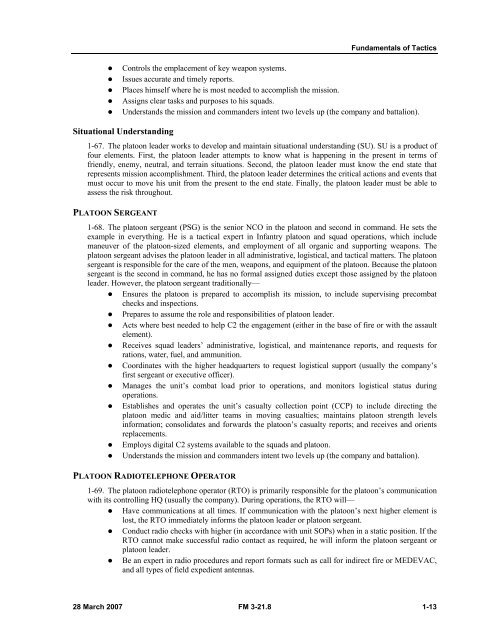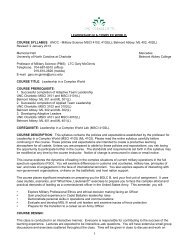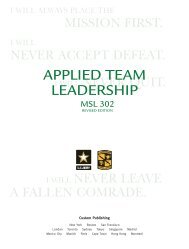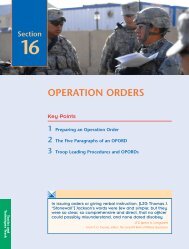Infantry Rifle Platoon and Squad - Sakai
Infantry Rifle Platoon and Squad - Sakai
Infantry Rifle Platoon and Squad - Sakai
Create successful ePaper yourself
Turn your PDF publications into a flip-book with our unique Google optimized e-Paper software.
Fundamentals of Tactics<br />
• Controls the emplacement of key weapon systems.<br />
• Issues accurate <strong>and</strong> timely reports.<br />
• Places himself where he is most needed to accomplish the mission.<br />
• Assigns clear tasks <strong>and</strong> purposes to his squads.<br />
• Underst<strong>and</strong>s the mission <strong>and</strong> comm<strong>and</strong>ers intent two levels up (the company <strong>and</strong> battalion).<br />
Situational Underst<strong>and</strong>ing<br />
1-67. The platoon leader works to develop <strong>and</strong> maintain situational underst<strong>and</strong>ing (SU). SU is a product of<br />
four elements. First, the platoon leader attempts to know what is happening in the present in terms of<br />
friendly, enemy, neutral, <strong>and</strong> terrain situations. Second, the platoon leader must know the end state that<br />
represents mission accomplishment. Third, the platoon leader determines the critical actions <strong>and</strong> events that<br />
must occur to move his unit from the present to the end state. Finally, the platoon leader must be able to<br />
assess the risk throughout.<br />
PLATOON SERGEANT<br />
1-68. The platoon sergeant (PSG) is the senior NCO in the platoon <strong>and</strong> second in comm<strong>and</strong>. He sets the<br />
example in everything. He is a tactical expert in <strong>Infantry</strong> platoon <strong>and</strong> squad operations, which include<br />
maneuver of the platoon-sized elements, <strong>and</strong> employment of all organic <strong>and</strong> supporting weapons. The<br />
platoon sergeant advises the platoon leader in all administrative, logistical, <strong>and</strong> tactical matters. The platoon<br />
sergeant is responsible for the care of the men, weapons, <strong>and</strong> equipment of the platoon. Because the platoon<br />
sergeant is the second in comm<strong>and</strong>, he has no formal assigned duties except those assigned by the platoon<br />
leader. However, the platoon sergeant traditionally—<br />
• Ensures the platoon is prepared to accomplish its mission, to include supervising precombat<br />
checks <strong>and</strong> inspections.<br />
• Prepares to assume the role <strong>and</strong> responsibilities of platoon leader.<br />
• Acts where best needed to help C2 the engagement (either in the base of fire or with the assault<br />
element).<br />
• Receives squad leaders’ administrative, logistical, <strong>and</strong> maintenance reports, <strong>and</strong> requests for<br />
rations, water, fuel, <strong>and</strong> ammunition.<br />
• Coordinates with the higher headquarters to request logistical support (usually the company’s<br />
first sergeant or executive officer).<br />
• Manages the unit’s combat load prior to operations, <strong>and</strong> monitors logistical status during<br />
operations.<br />
• Establishes <strong>and</strong> operates the unit’s casualty collection point (CCP) to include directing the<br />
platoon medic <strong>and</strong> aid/litter teams in moving casualties; maintains platoon strength levels<br />
information; consolidates <strong>and</strong> forwards the platoon’s casualty reports; <strong>and</strong> receives <strong>and</strong> orients<br />
replacements.<br />
• Employs digital C2 systems available to the squads <strong>and</strong> platoon.<br />
• Underst<strong>and</strong>s the mission <strong>and</strong> comm<strong>and</strong>ers intent two levels up (the company <strong>and</strong> battalion).<br />
PLATOON RADIOTELEPHONE OPERATOR<br />
1-69. The platoon radiotelephone operator (RTO) is primarily responsible for the platoon’s communication<br />
with its controlling HQ (usually the company). During operations, the RTO will—<br />
• Have communications at all times. If communication with the platoon’s next higher element is<br />
lost, the RTO immediately informs the platoon leader or platoon sergeant.<br />
• Conduct radio checks with higher (in accordance with unit SOPs) when in a static position. If the<br />
RTO cannot make successful radio contact as required, he will inform the platoon sergeant or<br />
platoon leader.<br />
• Be an expert in radio procedures <strong>and</strong> report formats such as call for indirect fire or MEDEVAC,<br />
<strong>and</strong> all types of field expedient antennas.<br />
28 March 2007 FM 3-21.8 1-13

















